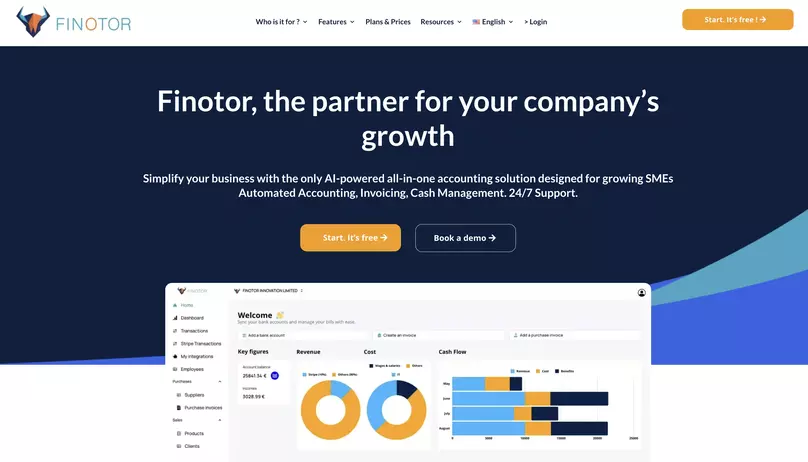Contents
- 1 Will AI Replace Accountants? What is the future of accounting?
- 2 Table of contents
- 3 Understanding AI in Accounting
- 4 Automation of Repetitive Accounting Tasks
- 5 Human vs. AI Accounting Capabilities
- 6 Evolving Role of Accountants with AI
- 7 Future of Accounting with AI
- 8 Conclusion: Accountants and AI
- 9 FAQ
Will AI Replace Accountants? What is the future of accounting?
Accounting professionals worldwide are wondering if artificial intelligence will eventually make their jobs obsolete. AI is rapidly transforming financial data processing through automation of repetitive tasks like invoice processing and bookkeeping. This article explores how AI and accountants can work together, creating a future where technology handles routine work while human expertise focuses on strategic decision making. We’ll examine real-time financial insights, machine learning applications, and the evolving role of accounting professionals in an increasingly automated industry.
Table of contents
- Understanding AI in Accounting
- Automation of Repetitive Accounting Tasks
- Human vs. AI Accounting Capabilities
- Evolving Role of Accountants with AI
- Future of Accounting with AI
- Conclusion: Accountants and AI
Understanding AI in Accounting
The Evolution of Artificial Intelligence in Accounting
Artificial intelligence has transformed financial data processing and accounting tasks over the past decade. What started with basic automation of invoice processing 20 years ago has evolved into sophisticated systems that can handle complex financial operations. The Dartmouth Conference in 1956 marked the birth of AI, but recent advances in algorithms have made them more reliable and adaptable to accounting needs. 🚀
Modern accounting firms are implementing AI tools to enhance efficiency across their operations. These tools automatically recognize data from variable-structure documents like invoices without prior setup. Cloud infrastructure facilitates sharing between millions of users, continuously improving AI technology performance. Ernst and Young has developed its EY.ai platform to help businesses leverage AI for strategy, transactions, tax management, and risk assessment. Meanwhile, KPMG has strengthened its Microsoft partnership to integrate artificial intelligence into audit, tax, and advisory services. 💼
AI-Powered Accounting Software and Technology
Leading AI accounting software solutions are transforming routine tasks like invoice processing and transaction categorization. These tools use optical character recognition to extract data from financial documents and machine learning to classify information accurately. Many solutions offer automated bank reconciliation, identifying patterns that would take humans hours to find. Learn more about the future of accounting with AI-powered software. ⚙️
With so many tools out there promising to automate financial tasks, picking the right AI accounting software can be a daunting task. So, we’ve developed this comparison table of some of the top AI-powered accounting platforms and their best features & automation capabilities. If you work as a freelancer, small business or growing startup, this side by side overview will help you determine which of these solutions match your requirements — from automatic transaction categorization to cash flow forecasting featuring smart reconciliations. Read this guide to make an informed decision and start saving time on your accounting process today.
| Software Platform | Key Features | Primary Automation Capabilities |
|---|---|---|
| Finotor | All-in-one accounting solution with integrated AI features. | Automatic transaction categorization, cash flow forecasting, detailed reporting, Audit of business activity. |
| Zoho Books | Accounting software employing AI to automate categorization and anomaly detection. | Transaction categorization, anomaly detection for financial data accuracy. |
| Xero | Offers invoicing, bank reconciliation, and financial reporting features. | Automated bank feeds, smart reconciliation, and reporting. |
| TaxDome | Helps manage tax preparation and accounting processes. | Automates client communication, document sorting, and transaction categorization. |
| Netgain | Automates financial workflows, improves data accuracy, and provides real-time insights. | Automates reconciliations, cash management, and financial reporting. |
| AI accounting software streamlines processes, enhances accuracy, and provides valuable insights. | ||
Machine learning algorithms analyze financial data patterns to deliver powerful insights that transform accounting practices. These systems can process millions of transactions, identifying anomalies that might indicate fraud or errors. As they learn from each interaction, their accuracy improves over time. According to PwC, 85% of CEOs believe artificial intelligence will significantly change how they do business in the next five years. The technology enables businesses to move from retrospective reporting to predictive analysis, helping firms anticipate financial trends rather than just react to them. 📊
Real-Time Financial Insights and Reporting
Artificial intelligence enables real-time access to financial data and instant report generation, transforming accounting from reactive to proactive. Instead of waiting days or weeks for monthly closings, businesses can now view their financial position continuously. This shift allows for faster decision-making and more agile responses to market changes. By 2030, approximately 75% of SMEs will use real-time data for instant financial decisions. Discover the benefits of AI in automation of financial reporting. ⏱️
AI-driven analytics tools help accounting professionals identify financial trends and forecast cash flow with remarkable accuracy. These systems analyze historical data to predict future outcomes, offering insights that would be impossible to generate manually. According to Sage research, AI can examine 100% of a company’s annual financial transactions, unlike humans who typically perform random checks. This comprehensive analysis leads to more reliable forecasting, helping businesses make strategic decisions about investments, expansions, or cost-cutting measures with greater confidence than ever before. 💡
Automation of Repetitive Accounting Tasks
Data Entry and Document Processing
Artificial intelligence transforms how financial documents are processed in accounting firms worldwide. Modern AI systems use optical character recognition to automatically extract data from invoices, receipts, and statements with remarkable accuracy rates reaching 99%. This automation dramatically reduces manual entry time while improving financial data reliability. 🤖
Here are the key accounting tasks transformed by artificial intelligence automation in modern accounting practices:
- Automation of data entry: AI automates manual data entry from invoices, receipts and financial statements through optical character recognition and intelligent processing. This significantly reduces time spent on this repetitive task.
- Transaction classification and coding: Machine learning algorithms analyze financial data and accurately classify them into appropriate accounting categories, saving valuable time and ensuring consistency.
- Automated bank reconciliation: AI automates bank reconciliation by matching bank transactions with accounting entries, reducing the time required for this task and minimizing errors.
- Document information extraction: AI can automatically extract information from invoices, receipts and bank statements, significantly reducing time spent on manual data entry and minimizing errors.
- Financial report generation: AI can generate financial reports, summarize key findings and even provide predictive insights based on historical data, providing a comprehensive overview of the financial situation.
Intelligent document processing transforms accounting workflows by reducing errors and accelerating accounts payable processes. Companies like TaxDome use AI to automatically sort and categorize financial documents, freeing accounting teams to focus on advisory work. The technology continuously improves through machine learning, gradually reducing human intervention while increasing efficiency in transaction processing.
Transaction Categorization and Reconciliation
AI systems now automatically categorize and match transactions across accounts with stunning precision. The software identifies patterns in vendor payments, recurring subscriptions, and revenue streams, then applies appropriate classifications without manual intervention. This automation can reduce reconciliation time by up to 80% for accounting professionals.
The magic of machine learning in accounting software becomes evident as these systems get smarter over time. After processing several months of transactions, AI adapts to business-specific patterns – recognizing seasonal expenses, department-specific purchases, and unique client billing structures. This adaptive learning provides increasingly accurate financial management with minimal human oversight. For example, Finotor’ AI categorizes 70% of transactions automatically after three months of use.
Tax Compliance and Reporting Automation
Artificial intelligence transforms tax preparation by analyzing transaction data to automatically identify deductions, track changing regulations, and flag potential compliance issues. Tax software with built-in AI can now process thousands of tax rules simultaneously, reducing preparation time by up to 30% while increasing accuracy.
Modern tax compliance tools enable accounting firms to handle more returns with greater precision and confidence. AI-powered systems can process hundreds of tax returns simultaneously while maintaining consistent application of tax rules across all client accounts. These systems also provide comprehensive documentation trails that strengthen audit protection by recording all financial decisions with supporting regulatory references.
Fraud Detection and Financial Security
AI technology continuously monitors transaction patterns to identify potential fraud and accounting errors that might escape human detection. Machine learning algorithms analyze thousands of data points to establish normal financial behavior patterns for each business, immediately flagging transactions that deviate from expected parameters. 🔍
What makes AI fraud detection particularly powerful is its ability to adapt to new schemes. As fraudsters develop new techniques, machine learning algorithms quickly recognize unfamiliar patterns and alert accounting teams to suspicious activities. This provides businesses with real-time protection that evolves alongside emerging threats, creating a dynamic security system that strengthens overall financial management processes.
Human vs. AI Accounting Capabilities
What AI Can and Cannot Do in Accounting
Artificial intelligence excels at processing massive volumes of financial data, automating repetitive tasks like data entry, bank reconciliations, and invoice management. AI-powered accounting software extracts and classifies relevant information, accelerating these processes while reducing human error in financial statements. 🤖
While AI can process data quickly, it struggles with context and judgment calls that human accountants excel at. Professional accountants provide value through interpreting regulatory gray areas, understanding client business contexts, and offering empathetic financial guidance during difficult situations. AI may analyze patterns efficiently, but lacks the human touch needed for complex financial decisions and ethical considerations that require professional judgment and experience. 📊
The Collaborative Future: Accountants Working with AI
Forward-thinking accounting firms are creating collaborative workflows where artificial intelligence handles routine tasks while human accountants focus on analysis, strategy, and client relationship management. This partnership leverages the best of both worlds – AI’s processing power and the accountant’s expertise – creating more efficient and valuable financial services. ✨
Real-world accounting teams are leveraging AI for data processing and analysis while focusing their professional expertise on interpreting results and making strategic recommendations. For example, firms like Ernst and Young use their EY.ai platform to help businesses manage strategy, transactions, taxation and risk assessment, while KPMG partners with Microsoft to integrate AI into audit, tax and advisory services. This collaboration allows accountants to build stronger client relationships through higher-value insights. 🚀
Ethical Considerations and Human Oversight
The integration of AI in accounting raises ethical issues including data privacy concerns, algorithmic bias, and the importance of human review for critical financial decisions. Tax strategies and complex financial reporting particularly require professional oversight to ensure compliance with regulations and proper judgment in gray areas where AI might struggle. 🔐
Accountants are evolving into AI supervisors, responsible for reviewing automated outputs and ensuring compliance with professional standards. A study by PwC found that 85% of CEOs believe AI will significantly change how they do business in the next five years, highlighting the importance of maintaining accountability for financial reporting regardless of automation levels. Human judgment remains important for interpreting AI results and making informed financial decisions based on business context. 📈
Client Expectations and Relationship Management
Client expectations are evolving as artificial intelligence becomes more prevalent in accounting practices. Today’s businesses expect both technological efficiency in data processing and human strategic guidance for complex financial decisions. The accounting profession must balance these expectations by demonstrating value beyond automation alone can deliver. 🌟
Modern accounting professionals need relationship management strategies that balance technology-enabled insights with personalized advisory services. As routine tasks become automated, accountants must demonstrate value through strategic advice, industry knowledge, and understanding clients’ unique business challenges. According to ACCA, 66% of finance professionals believe AI will add value to their roles, allowing them to focus on providing customized financial guidance that builds stronger client relationships. 🤝
Evolving Role of Accountants with AI
From Number-Crunchers to Strategic Advisors
Artificial intelligence is transforming accountants from data processors into strategic business advisors focused on financial planning and decision support. With AI handling routine tasks, accounting professionals now spend more time analyzing financial trends and providing valuable insights that drive business growth. This shift allows accountants to demonstrate their expertise beyond traditional number-crunching. 🧠
Modern accountants excel in areas where AI capabilities fall short, such as developing comprehensive business strategies and guiding clients through complex regulatory environments. Top firms like Ernst and Young are leveraging platforms such as EY.ai to help businesses apply AI across strategy, transactions, and tax planning. KPMG has strengthened its partnership with Microsoft to integrate artificial intelligence throughout its audit and advisory services. These collaborations highlight how human judgment remains important while technology handles the data processing. Understand AI’s revolutionary impact on accounting.
Skills Accountants Need in the AI Era
Today’s accountants need technical skills including data analysis, technology management, and the ability to interpret AI-generated financial insights. Professionals must develop proficiency with accounting software tools that incorporate machine learning while maintaining their core financial expertise. The most successful accountants combine technical knowledge with strategic thinking to deliver maximum value.
As automation handles routine tasks, soft skills have become increasingly valuable for accounting professionals. Critical thinking allows accountants to evaluate complex financial situations and determine appropriate actions. Financial storytelling helps translate data into actionable recommendations for clients. Strong ethical judgment ensures compliance with regulations despite increasing automation. Client relationship management becomes important as accountants shift toward advisory roles. The ability to communicate complex financial concepts clearly to non-financial stakeholders sets top performers apart in today’s technology-driven accounting firms.
Professional Development and Education Trends
Accounting education is evolving rapidly to prepare professionals for an AI-powered industry. Universities are integrating technology courses, data science fundamentals, and strategic advisory skills into traditional accounting programs. Professional certifications now emphasize technological proficiency alongside financial expertise, reflecting the changing demands of the workplace.
- AI training allows employees to save 22% more time.
- Mastery of data analysis: The ability to analyze large volumes of financial data, identify trends and extract actionable insights is essential for making informed decisions and providing strategic advice.
- Enhancement of non-technical skills: Soft skills such as communication, critical thinking, adaptability, ethics and collaboration are increasingly important as AI automates routine tasks and allows accountants to focus on human interactions and advice.
- Knowledge of standards and regulations: Accountants must stay current on accounting standards, regulations and complex financial instruments, as AI needs professionals who understand the nuances of the field to ensure the accuracy and integrity of financial information.
- Adaptation to continuous learning: The accounting profession is constantly evolving, and accountants must be willing to embrace lifelong learning and continuously develop their skills to thrive in the AI era.
Established accountants can pursue specialized certifications in data analytics, AI management, and advanced financial advisory services to complement artificial intelligence capabilities. Professional organizations offer continuing education focused specifically on technology integration. Mid-career professionals can transition to AI-complementary roles by developing expertise in cybersecurity, process optimization, or strategic consulting. According to PwC, 85% of CEOs believe artificial intelligence will significantly change how they do business within five years, making upskilling essential.
Future of Accounting with AI
Emerging AI Technologies Shaping Accounting
The accounting profession faces transformation through cutting-edge AI technologies like natural language processing, predictive analytics, and autonomous systems. These innovations are already changing how financial data is processed and analyzed, with AI-powered tools handling increasingly complex tasks. The integration of these technologies allows for more accurate financial reporting and better decision-making capabilities. 🔮
Blockchain integration with AI is enhancing financial transparency while machine learning improves predictive insights and risk assessment. Companies like Cegid are developing solutions that use AI to correctly assign bank entries and invoices, with results improving as the AI learns. By 2030, over 70% of small businesses will integrate AI for financial decisions, fostering innovation and growth across the industry. This technology combination promises to revolutionize audit capabilities and tax planning optimization.
Predictions for the Accounting Industry
Industry forecasts suggest significant AI adoption will reshape accounting over the next decade. According to Sage research, traditional monthly closings will be replaced by dynamic accounting practices, with approximately 75% of SMEs using real-time data for instant financial decision-making by 2030. AI will drive structural changes in how firms operate and deliver services.
Artificial intelligence will likely create new accounting specializations while consolidating traditional bookkeeping functions. Firms will increasingly differentiate themselves through strategic insights built on AI-processed financial data rather than basic compliance services. By 2030, over 90% of small businesses will adopt AI tools to prevent financial errors and fraud, potentially reducing these issues by more than 95%. This shift represents a fundamental change in how accounting services are valued and delivered.
Preparing Your Accounting Firm for AI
Accounting firms beginning their AI journey should focus on comprehensive technology assessment, staff training, process redesign, and client communication strategies. Starting with a progressive, methodical approach to AI education adjusted to different skill levels helps prevent digital divides within the organization. According to research, AI implementation works best when prioritizing tasks performed by humans that are repetitive and used by many team members.
Successful implementation of AI-enhanced accounting requires effective change management addressing staff concerns and demonstrating clear client benefits. Creating a formal AI usage charter is important for reliable implementation – it formalizes best practices and raises awareness about confidentiality issues. Regional training institutes offer many appropriate courses, including “prompt engineering” (the art of giving precise instructions to AI). From 2026, AI Act regulations will mandate training for companies using AI systems, making preparation essential.
Conclusion: Accountants and AI
Artificial intelligence is transforming accounting by automating data entry, transaction processing, and basic reporting tasks. This technology enables accounting professionals to shift from number-crunching to delivering strategic financial analysis and business recommendations that drive growth. The future belongs to accountants who can leverage AI tools while providing uniquely human insights.
The partnership between accountants and artificial intelligence represents the optimal path forward for the financial industry. While AI handles routine processing, compliance monitoring, and preliminary analysis, human accountants contribute critical thinking, ethical judgment, and client relationship skills that technology cannot replicate. Together, they form a powerful combination that delivers comprehensive financial intelligence and strategic guidance to businesses of all sizes. The accounting firms that thrive tomorrow will be those that successfully integrate cutting-edge technology with high-value human expertise. 🧠💼
AI is transforming the accounting landscape, not replacing professionals but enhancing their capabilities. While technology handles routine data processing and transaction categorization, accountants are evolving into strategic advisors who deliver value through financial analysis and business insights. The future belongs to those who embrace this partnership – where artificial intelligence manages the numbers and human intelligence transforms them into strategic decisions. Firms that successfully integrate AI tools with professional expertise will gain a competitive edge in tomorrow’s financial world. 🚀
FAQ
What are the risks of algorithmic bias in AI accounting? 🤔
AI systems can be biased based on the data they’re trained on, leading to unfair outcomes. This can result in errors in financial analysis, fraud detection, or risk assessment. For example, an algorithm trained on biased financial data might discriminate against certain businesses when evaluating creditworthiness.
To mitigate these risks, it’s essential to ensure high-quality, diverse data is used for training algorithms. Accountants should develop data management and data science skills to better understand and control AI tools. This helps prevent biased outcomes and ensures fairness in financial processes. 🚀
How does AI affect entry-level jobs in accounting? 💼
AI and automation are transforming accounting, impacting entry-level jobs by automating repetitive tasks. This includes data collection, invoice processing, and even legal document production. Tasks traditionally done by beginners are increasingly handled by AI.
This shift creates opportunities for beginners to focus on higher-value tasks like data analysis and strategic advice. Developing skills in financial analysis, communication, and strategic consulting becomes essential. Continuous learning and adaptation to new technologies are vital for success in this evolving environment. 💡
How to choose the right AI accounting software? ⚙️
Choosing the right AI accounting software involves several considerations. First, define your business’s specific needs, such as transaction volume and accounting complexity. Consider your budget, as some software offers basic features for free, while others require a subscription. 💰
Ensure the software can integrate data from various sources like bank statements and invoices. Ease of use, compatibility with existing software (like ERP systems), and the quality of generated entries are also important. Don’t forget to check for adequate support and training from the provider. 📈
How does AI help prevent fraud in real-time? 🔍
AI helps prevent fraud in real-time by analyzing vast financial datasets to identify unusual patterns and anomalies. Machine learning algorithms differentiate these anomalies from normal fluctuations, ensuring accurate analysis. The system continuously monitors transactions and alerts teams to suspicious behavior.🤖
Banks use machine learning systems to verify millions of transactions hourly, spotting suspicious activities in real-time. AI analyzes regular, non-fraudulent customer behavior to identify suspect activities. This provides real-time protection that evolves alongside emerging threats, strengthening overall financial management processes. 🛡️
How can AI help CPAs better advise their clients? 🤝
AI transforms the role of CPAs by automating repetitive tasks, allowing them to focus on strategic advice. AI can process, analyze, and interpret vast data volumes at unmatched speed and precision, revolutionizing accounting data management, financial forecasting, and strategic consultation. This enables more in-depth and strategic insights. ✨
By adopting AI, CPAs can improve efficiency and productivity, processing more work in less time and reducing costs. AI provides more accurate, data-driven advice, strengthening their role as strategic advisors. For instance, AI can analyze market data to identify trends that human analysts might miss, leading to better investment strategies. 📊









